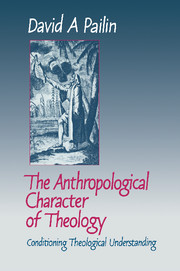Book contents
- Frontmatter
- Contents
- Preface
- 1 INTRODUCTION TO A STUDY OF THEOLOGY
- 2 FAITH, BELIEF, THEOLOGY AND REASON
- 3 GOD AS COSMIC PROJECTION
- 4 GOD AS ACTUALIZING REGULATIVE IDEAS
- 5 THEOLOGY AND RELIGIOUS EXPERIENCE
- 6 THEOLOGY AND THE APPREHENSION OF REVELATION
- 7 THEOLOGY AND HUMAN NEED
- 8 THEOLOGY AND THE COMPLETION OF UNDERSTANDING
- 9 CONCLUSION
- Notes
- Select bibliography
- Index
6 - THEOLOGY AND THE APPREHENSION OF REVELATION
Published online by Cambridge University Press: 26 August 2009
- Frontmatter
- Contents
- Preface
- 1 INTRODUCTION TO A STUDY OF THEOLOGY
- 2 FAITH, BELIEF, THEOLOGY AND REASON
- 3 GOD AS COSMIC PROJECTION
- 4 GOD AS ACTUALIZING REGULATIVE IDEAS
- 5 THEOLOGY AND RELIGIOUS EXPERIENCE
- 6 THEOLOGY AND THE APPREHENSION OF REVELATION
- 7 THEOLOGY AND HUMAN NEED
- 8 THEOLOGY AND THE COMPLETION OF UNDERSTANDING
- 9 CONCLUSION
- Notes
- Select bibliography
- Index
Summary
John Macquarrie describes revelation as ‘the primary source of theology’ and ‘a basic category in theological thinking’. It has a gift-like character. Through ‘the initiative of that towards which … faith is directed’ people receive an understanding, both of themselves and of ‘the wider being’ within which they exist, which has hitherto been concealed from them. In other words, revelation may be seen as God making Godself known to humanity and thereby providing a God-guaranteed basis for theological understanding. Where revelation is so understood, it may also be considered to provide a means by which theistic understanding may transcend the limits and cultural conditioning which normally influence human ways of thought. In revelation, that is, people receive a direct, unconditioned knowledge of the truth from the one who is unaffected by the distorting perspectives of the human situation.
This understanding of revelation is attractive because it allows those believers and theologians who accept it to claim the authority of God for some of their utterances. Unfortunately for these would-be oracles, it does not survive examination. Both in practice and in principle allegedly revealed knowledge of the divine is conditioned by the ways of understanding of those who grasp it. In order to show this, the following discussions of revelation will initially entertain the assumption that revelation comes from God. When it moves on to the relationship between supposedly revealed truths and events, however, it will be suggested that those truths are most adequately understood as insights evoked through particular ways of interpreting certain events rather than as direct divine communications to humanity.
- Type
- Chapter
- Information
- The Anthropological Character of TheologyConditioning Theological Understanding, pp. 113 - 139Publisher: Cambridge University PressPrint publication year: 1990



